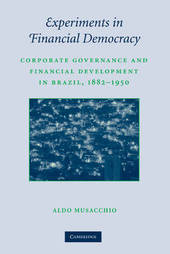
|
Experiments in Financial Democracy: Corporate Governance and Financial Development in Brazil, 1882-1950
Hardback
Main Details
| Title |
Experiments in Financial Democracy: Corporate Governance and Financial Development in Brazil, 1882-1950
|
| Authors and Contributors |
By (author) Aldo Musacchio
|
| Series | Studies in Macroeconomic History |
|---|
| Physical Properties |
| Format:Hardback | | Pages:326 | | Dimensions(mm): Height 229,Width 152 |
|
| Category/Genre | Economic history
Finance |
|---|
| ISBN/Barcode |
9780521518895
|
| Classifications | Dewey:338.60981 |
|---|
| Audience | | Professional & Vocational | |
|---|
| Illustrations |
45 Tables, unspecified; 17 Line drawings, unspecified
|
|
Publishing Details |
| Publisher |
Cambridge University Press
|
| Imprint |
Cambridge University Press
|
| Publication Date |
14 September 2009 |
| Publication Country |
United Kingdom
|
Description
This book provides a detailed historical description of the evolution of corporate governance and stock markets in Brazil in the late nineteenth and twentieth centuries. The analysis details the practices of corporate governance, in particular the rights that shareholders have to restrict the actions of managers, and how that shaped different approaches to corporate finance over time. In the case of Brazil, even if the protections for investors included in national laws were relatively weak before 1940, corporate charters contained a series of provisions that protected minority shareholders against the abuses of large shareholders, managers, or other corporate insiders. The investigation uses the Brazilian case to challenge some of the key findings of a recent literature that argues that legal systems (e.g., common vs. civil law) shape the extent of development of stock and bond markets in different nations.
Author Biography
Aldo Musacchio is an Assistant Professor in the Business, Government, and International Economy Unit of Harvard Business School and a Research Fellow of the National Bureau of Economic Research, Cambridge, Massachusetts. Before joining Harvard in 2004, Professor Musacchio was a Fellow of the Center for Democracy, Development, and the Rule of Law at Stanford University and a Fellow of the Institute for Humane Studies at George Mason University. His primary fields of expertise are the business and economic history of Latin America, corporate governance, the political economy of development, and new institutional economics. Professor Musacchio's current research explores the role of property rights and the legal environment for long-run economic development, including the ways in which firms adapt to adverse economic conditions. His paper 'Can Civil Law Countries Get Good Institutions? Lessons from the History of Creditor Rights and Bond Markets in Brazil' won the Arthur H. Cole Prize for best paper in the Journal of Economic History, 2007-8. Professor Musacchio received his Ph.D. in the economic history of Latin America from Stanford University.
Reviews'Aldo Musacchio has drawn upon a sophisticated analysis of numerous archival sources and many firm records to provide an interesting history of Brazilian banking over the course of seven decades. This study is used to deal with important issues relating to legal and institutional factors influencing management structure and performance. Given our current discussions of the role of institutions on the desired form of bank behavior, this study has a much broader significance for understanding economic considerations in other parts of the world.' Stanley L. Engerman, University of Rochester 'Many scholars have theorized about the links between law and economics. In this marvellous book, Aldo Musacchio uses meticulous historical research to reveal how these links actually operated in practice. He shows how, in Brazil a century ago, corporate governance was ahead of national law when it came to offering protection to investors in both bonds and stocks. This monograph is a major contribution not just to the field of Brazilian history but to the much larger social science literature on institutions and economic growth.' Niall Ferguson, Harvard University and author of The House of Rothschild, The Cash Nexus, and The Ascent of Money 'This thought-provoking book convincingly demonstrates the value of historical case studies for our understanding of the processes of economic development. More than any work I know it shows how misleading inferences from cross-country growth regressions can be. Musacchio challenges in one fell swoop both the law-and-finance and the colonial-origins theories of economic development by showing that Brazil's economic problems have their roots in its response to the world wars and macroeconomic shocks of the twentieth century.' Naomi Lamoreaux, University of California, Los Angeles 'Aldo Musacchio has written an insightful study of Brazilian financial history. Disconcerting perhaps to a law professor, and to others who see legal institutions as primary and determinative, Musacchio shows that the ups and downs of finance in Brazil over nearly a century do not tie in nicely to legal change. Rather, he argues, they tie more closely to broad-based change in the economic demands on business enterprise, such as changes in cross-border capital flows or inflationary shocks. Moreover, within a single nation's legal system, the legal modes - from legislation to contract to regulation - change over time. Musacchio's book, although focused on Brazilian financial history, is not just for Brazilianists.' Mark J. Roe, Harvard Law School 'If you thought that the dismal state of corporate governance in Latin America is a direct product of its colonial or civil law heritage, Experiments in Financial Democracy will make you think again. Based on painstaking archival work, Aldo Musacchio demonstrates that in the late nineteenth century, investors in Brazilian corporations were better protected than they were in the late twentieth century. The law secured the claims of bondholders while many firms protected minority shareholders in their corporate charters. The work convincingly demonstrates that even poor countries can create and implement institutions favorable to capital markets. This optimistic historical finding is fully relevant to our troubled financial times.' Jean-Laurent Rosenthal, California Institute of Technology
|